A visual analysis of Sebastian Vettel’s career in numbers and charts.
“Numero uno is back, Ferrari is back.”
Sebastian Vettel had just won the 2015 Malaysian Grand Prix, his second race with the Italian racing giants Ferrari since joining them from Red Bull Racing.
“Grazie, grazie. Forza Ferrari”
With his index finger pointed to the skies, F1 fans could be heard groaning around the world that the sport was destined for more pole to flag processions as Vettel disappeared into the distance, not to be troubled for the duration of the race.
Except that didn’t happen. Not with Vettel, or Ferrari, anyway.

Since 2015, Mercedes have won 5 successive Constructors championships, with Lewis Hamilton winning 50% of races (that’s right, on average, Hamilton has won every other race for the last 5 years). Vettel (14%) & Ferrari (17%), meanwhile, have been left to scrap with Red Bull Racing for the remaining with a far fewer wins.
Fast forward to 2020, with the racing season still yet to begin due to Coronavirus, the highlight of the Formula 1 paddock is the announcement that Vettel will leave Ferrari at the end of the 2020 season. Without a viable opening at one of the top teams for next season, Vettel’s F1 future hangs in the balance.
In this article, I look back at Vettel’s career to visually analyse his performance against the F1 greats and to assess whether his time at Ferrari should be considered a success.
The story so far...
Rain is a great leveller in Formula 1, shifting the balance of importance from car to driver and testing a racer’s ability to adapt in testing conditions. Wet races are typically dramatic occasions in F1, with spray being flung from the tread of the tyres and cars sliding around (and occasionally off..) the track in slippery conditions.
Exceptional performance in such races often sticks in the mind. Senna was said to come alive in the wet, with exhilarating drives such as the 1993 European Grand Prix where he slipped back to 5th off the starting grid before 4 overtakes in the first lap regained him 1st place. Jenson Button’s victory in a wet race in Montreal, 2011 still induces shivers, when he raced from 20th to win on the final lap (on that occasion to the detriment of Vettel).
It was at a very wet Monza in 2008 that a 21-year old Vettel became the youngest pole-sitter and race winner in F1 history. He was in good company; both Schumacher & Senna’s first wins came in wet races where they outdrove their cars in challenging wet weather conditions. Given the nature of his age and nationality, the media were quick to draw comparisons with Schumacher, some referring to him as ‘baby Schumi’, though Vettel was quick to write these off as ‘ridiculous’ at the early stages of his career.
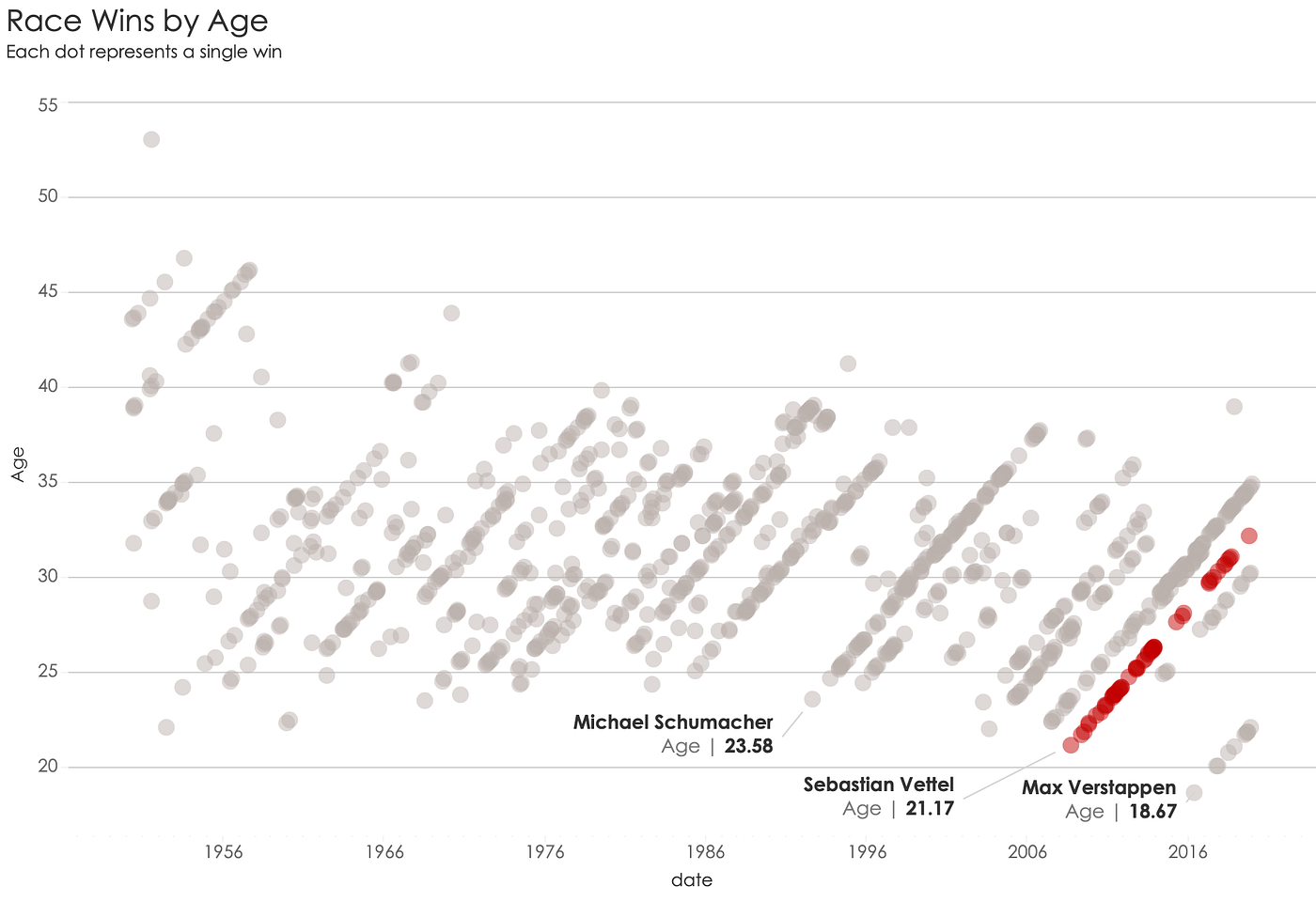
For a long while, however, the comparisons might not have been as ridiculous as Vettel initially suggested. Following Vettel’s breakthrough season in 2008 with Toro Rosso (Red Bull’s sister team), he was promoted into the vacant seat left by a retiring David Coulthard at Red Bull Racing for the start of the 2009 season.
With Christian Horner at the helm and Adrian Newey leading the design of the car, Vettel was provided with the means to mount a serious title challenge in 2009 through Red Bull’s ‘RB5’ . Red Bull secured 6 wins in the 2009 season as Brawn’s Jenson Button raced to the Driver’s Championship. Individually, Vettel won 4 races and finished the year as runner up by 11 points.
It wouldn’t be long until Vettel won his first Driver’s Championship. In 2010, the German raced to the World Title, in doing so breaking the record for the youngest driver to claim the Driver’s Championship. He followed this by winning the subsequent 3 world titles in a row, breaking or equalling a host of records including most wins from pole in a season (9), most consecutive race wins (9) and most wins in a season (13, shared with Michael Schumacher).
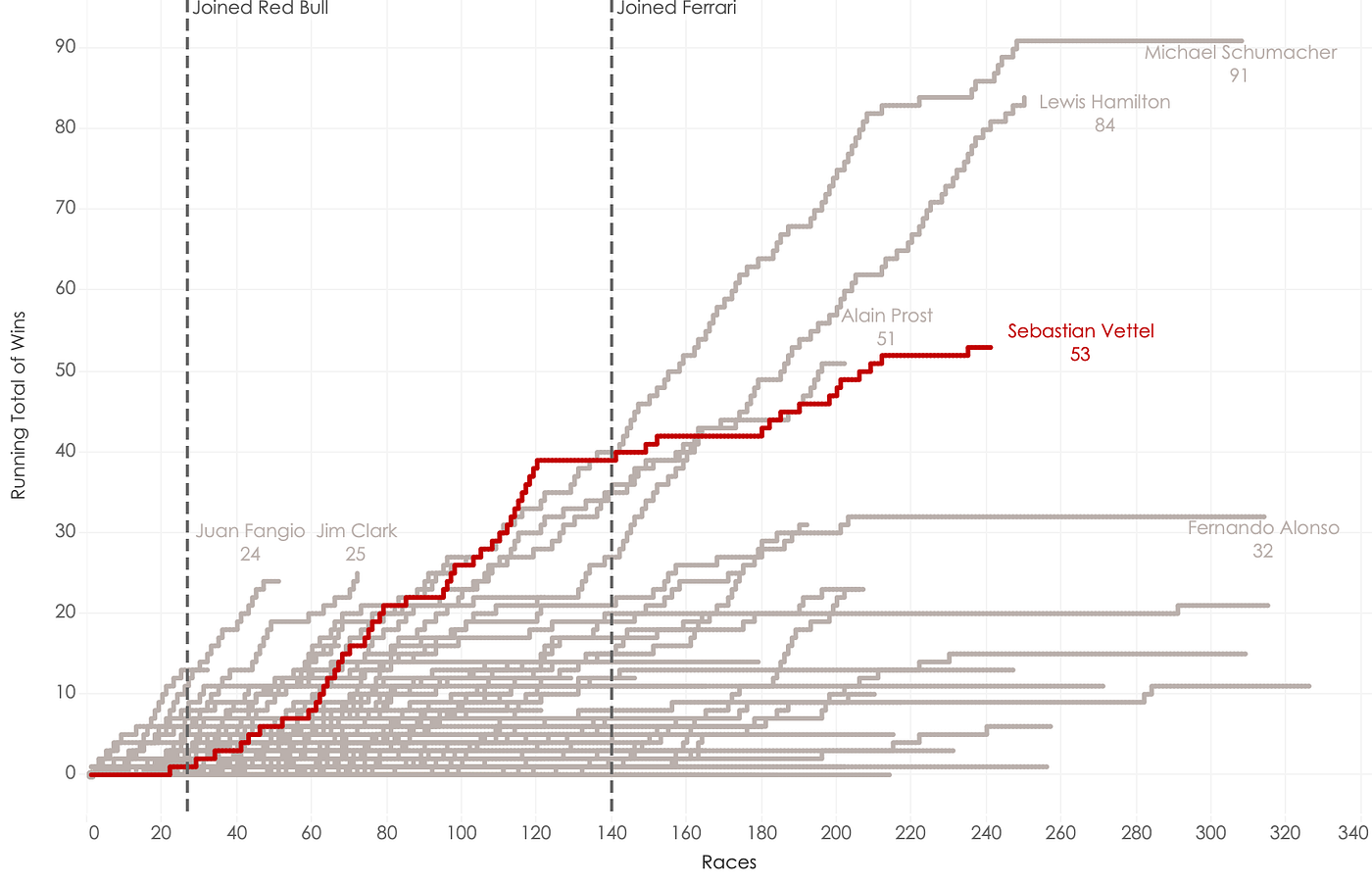
Between 2009 & 2013, Vettel & Red Bull created a dynasty comparable to Schumacher & Ferrari, and later Hamilton & Mercedes. The rate at which Vettel won races put him right at the top of the pile; at 120 races his trajectory was well ahead of other F1 greats Senna, Prost & Hamilton. He had even surpassed Schumacher’s win rate mid way through the 2013 season (at 113 races into their respective careers).
But then, all of a sudden, the line stopped increasing. The gradient moves from a steep incline to a gentle slope. Vettel failed to win a single race in the 2014 season before securing his ‘dream move’ to F1’s most prestigious and decorated team.
The relationship got off to a promising start. In a season dominated by Lewis Hamilton & Nico Rosberg, Vettel was the only non-Mercedes driver to win a race and was the only real challenger outside of Toto Wolff’s team. It provided a base for Ferrari to become more competitive over the winter break, with Vettel more settled in the team and culture at Maranello.
Unfortunately, this didn’t pan out. Ferrari didn’t win a single race in 2016, slipping behind Red Bull in the Constructors championship to compound Vettel & Ferrari’s misery. Vettel’s current win count in 5 years at Ferrari is just one more than he achieved in his most successful year at Red Bull.
So why did the move (and Vettel’s win curve) fall flat, and what does this mean for his position in F1 legend?
Comparing Vettel’s Red Bull & Ferrari careers

When we aggregate the data to compare Vettel’s performance at Ferrari and Red Bull, there is very little between them. At the highest level, across all races, Vettel’s average finishing position is just 0.1 places higher at Ferrari than at Red Bull. Taking the median provides a very similar story; Vettel’s median finishing position at Ferrari & Red Bull was 3rd place.
Stepping down a level to assess the results at a seasonal level illustrates a little more variation, but paints a similar picture again. In fact, Vettel’s average finishing position with Ferrari in 2015, 2017 and 2018 was lower than in two of his World Title winning seasons at Red Bull (2010 & 2012). In 2017 and 2018 Vettel’s end of season points totals were also considerably higher than in 2010 and 2012.
It isn’t until you dig deeper into the individual results that differences begin to emerge. In all but the 2014 season, Vettel’s most frequent finishing position was 1st. This only happened once at Ferrari, in 2018. The remainder of his Ferrari results per season were clustered around 2nd, 3rd and 4th positions. These are undoubtedly still an impressive set of results, but the lack of 1st place finishes makes a huge impact on Vettel’s ultimate success with Ferrari.
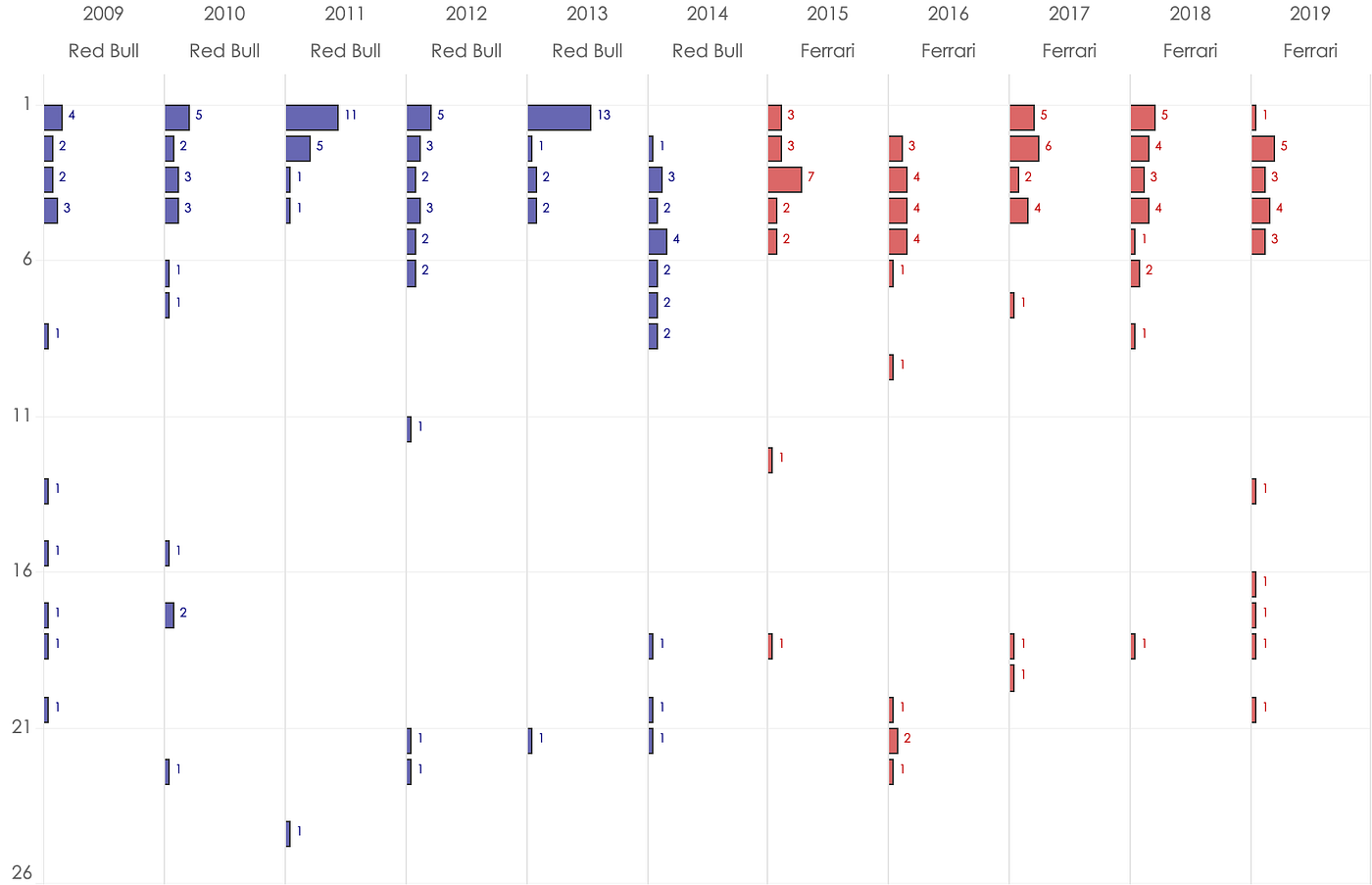
Firstly, in a sport where race wins is a metric by which drivers are compared to one another, anything other than 1st place is a failure. Put eloquently by Senna; ‘being second is to be the first of the ones who lose’. What’s more, F1 stats are limited by the number of races per season. In Football or Rugby there might be 40–50 games in a season, plus international fixtures, whereas F1 drivers have a maximum of 20–22 races per season to secure victories.
Secondly, and more impactful to his Title challenges, is the incentive placed on first place by the FIA’s point allocation system. 25 points is granted for a win, 7 more than for 2nd place. The gap from second to third is 3 points, the same for 3rd to 4th, and the gaps decrease thereafter. If points decreased in a linear manner, multiple 2nd & 3rd finishes wouldn’t have been such bad news for Vettel, but the scale of the diminishing returns from a single place drop gives race wins that extra importance. As a result, Vettel’s clustering of non-winning podium finishes during his Ferrari days seriously inhibited his ability to add to his World Title haul.
To understand why Vettel was unable to convert more of his podium finishes to race wins, we can descend a further level of granularity to race level. Was it Vettel that was responsible for failing to win races, or was the Ferrari package simply not competitive when it needed to be in the battle against Mercedes supremacy?

Based on the Constructor standings (the summation of the points from all drivers within a team), Ferrari were not close to challenging the eventual winners in 2015, 2016 and 2019 (Mercedes were champions in all 5 years). In 2017 & 2018, however, the gap was considerably smaller, suggesting that Ferrari as a team were closer to Mercedes in terms of performance.
In both these years, Vettel finished as runner up in the Championship and achieved 5 race victories. Both seasons also started strongly, with Vettel leading the championship for much of the first half of the seasons. On both occasions, however, he let the lead slip away through a string of low finishes in the mid to back end of the season.
In Vettel’s defence, some of these low finishes were due to engineering issues. A late puncture at the British GP, followed by a turbo issue in Malaysia and a faulty spark plug in Japan all caused Vettel to lose positions and points. At the same time, driver errors and frustrations crept into his racing, that weren’t as prevalent in his time with Red Bull.
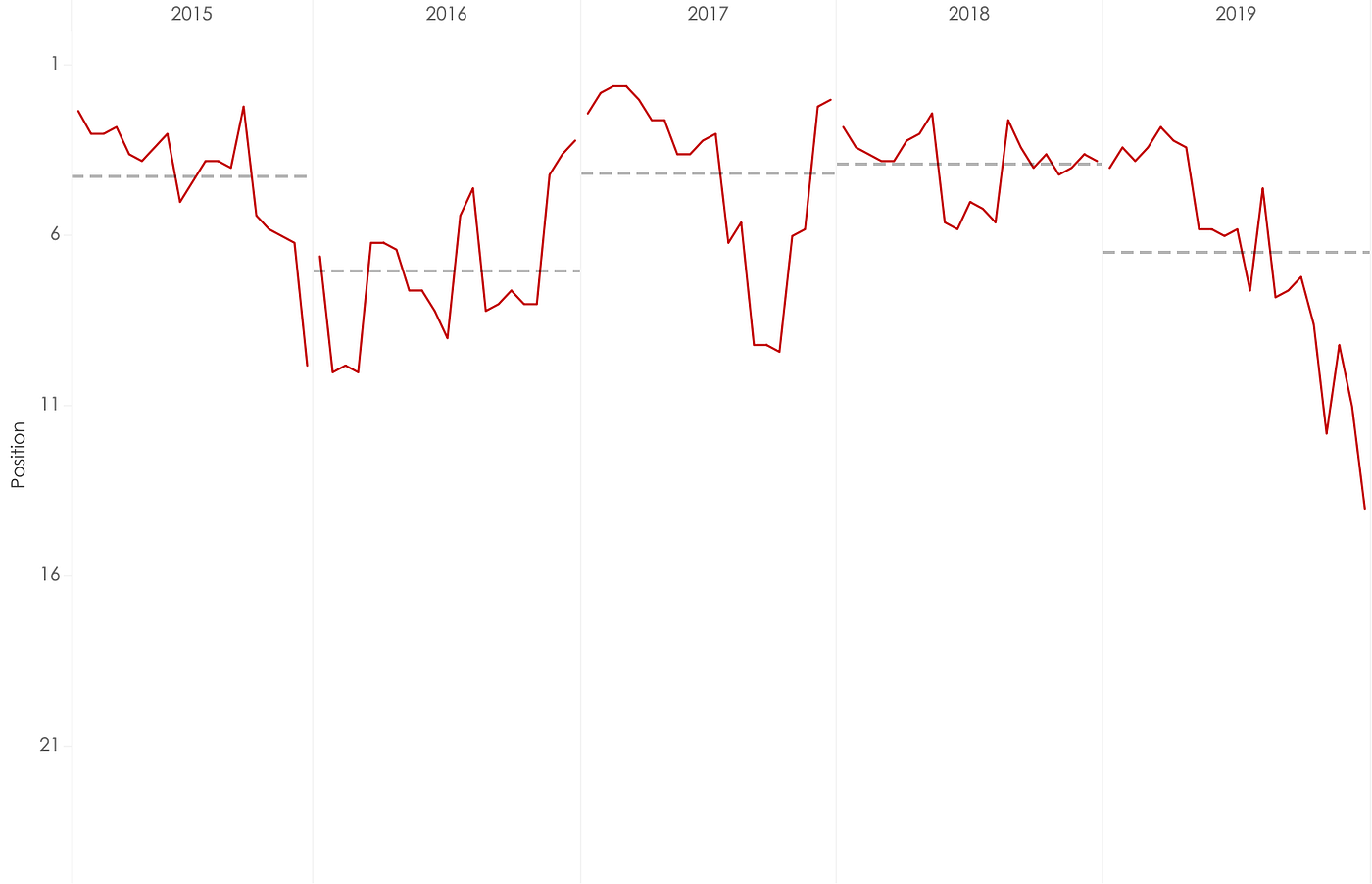
In 2017, Vettel’s problems began in Azerbaijan, where he was guilty of shunting Hamilton under safety car conditions, claiming that the Brit was ‘brake testing’ him. Telemetry data from Hamilton’s car showed that this was not the case. In Singapore, Vettel tangled with Raikkonen and Verstappen off the line, leading to Ferrari’s first ever double retirement on the first lap of a race.
2018 was meant to be the season that the Ferrari package was finally a match for Mercedes. Ferrari & Vettel led both championships at the half way stage, but again driver and team conspired to throw the lead away. Vettel was leading the German Grand Prix, closing in on victory at his home race, when he spun off into the barriers and ended his race. In Monza, Vettel made clashed with Hamilton and spun again, dropping to 18th place on the opening lap.

While Ferrari’s reliability and strategy calls have not always been as well executed as at Mercedes, the series of unforced errors in qualifying and on race day became the pattern of Vettel’s races. His truly great performances became few and far between (though did not disappear entirely, Spa 2018 was a victory reminiscent of his Red Bull days).
It’s difficult to say where Vettel would have finished in the 2017 & 2018 seasons had they not been tarnished by the team and driver mistakes. Both parties must take some responsibility in their failure to deliver either a Drivers or Constructors World Championship in their time together, but Vettel’s responsibility as lead driver and a 4-time World Champion was to deliver mistake free performances and to lead the team by example. In this respect his time at Ferrari cannot be considered a success.
By the 2019 season, Vettel’s relationship with Ferrari was beginning to feel strained. The excuses and apologies were running dry and there was an aura of exhaustion surrounding the pair. To add to this, there was a new kid on the block who was starting to make a name for himself and attract the attention of Ferrari’s Tifosi.
One element that may have accelerated Vettel’s departure from Ferrari was the arrival of Charles Leclerc. It becomes apparent when placing Vettel’s careers with Red Bull & Ferrari next to each other that the German prefers a certain team dynamic.

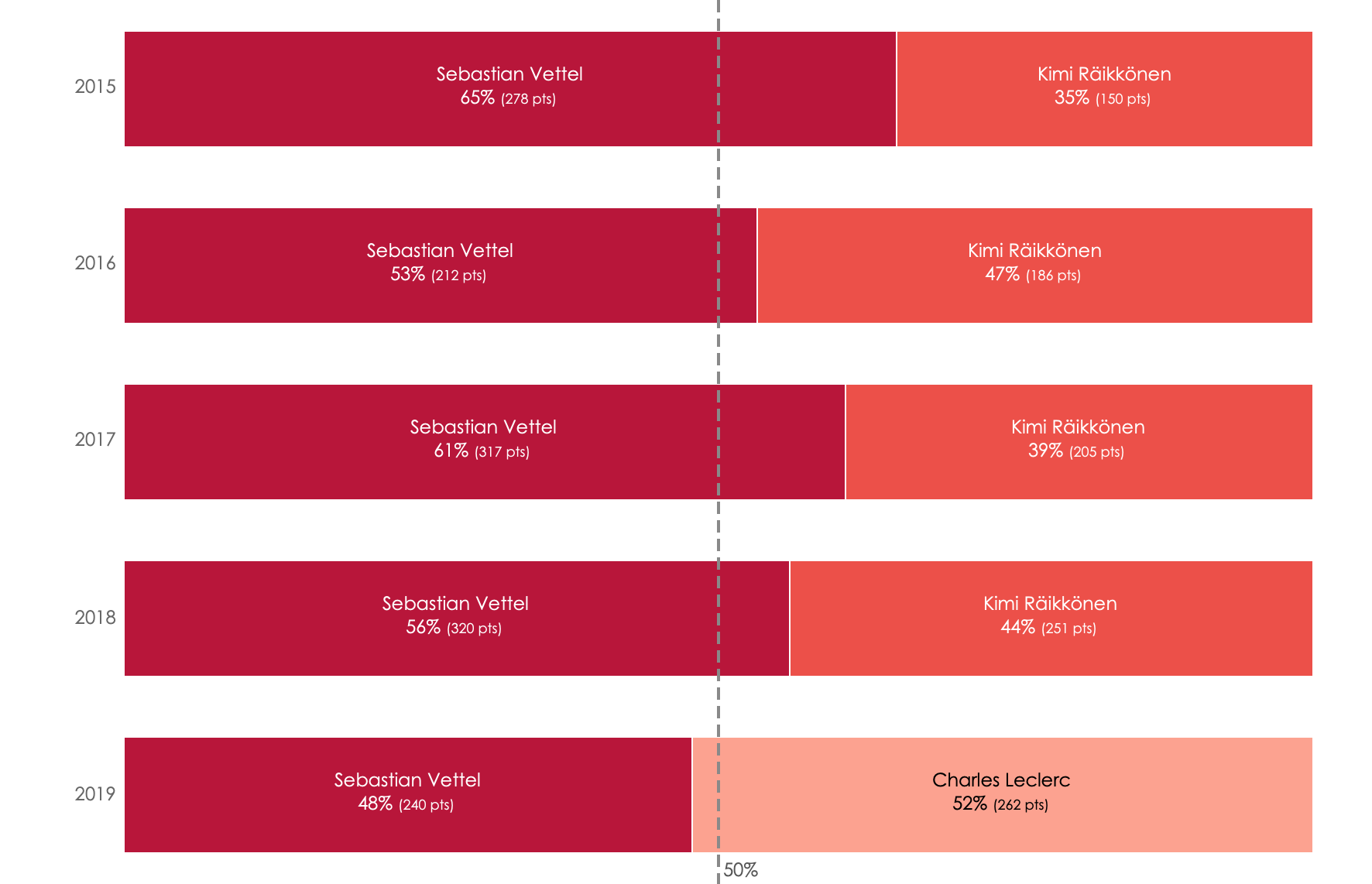
At both teams, Vettel enjoyed the bulk of his success as ‘number 1’ or lead driver in the team, (formally or informally). Both Webber and Raikkonen were experienced drivers, both very capable of winning races but heading towards the end of their careers when Vettel joined Red Bull & Ferrari respectively. While both were competitive, neither threatened Vettel too strongly over the course of a season; they failed to outscore Vettel in 8 seasons of racing.
This statistic changes, however, when Vettel is paired with a young, talented driver keen to make their mark on F1. At Red Bull it was Daniel Ricciardo, at Ferrari it is Charles Leclerc. Like Vettel, Ricciardo was promoted to the Red Bull seat from Toro Rosso and quickly won the hearts of F1 fans with is humour, beaming smile and his crafty overtakes and ability to win races.
The parallels between Ricciardo & Leclerc’s emergence alongside Vettel are intriguing. In 2014, while Vettel failed to win a race, Ricciardo won 3 and finished 71 points ahead of his teammate. In 2019, Vettel won a single race while Leclerc raced to 2 victories and outscored his teammate in his debut season with Ferrari. With the 2020 season looking set to start in a very different format to the one fans are used to, atleast Vettel will have an opportunity to fight back against Leclerc, if only for whatever the makeshift calendar can afford in terms of races.
Where does this leave Vettel?
On joining Ferrari, Vettel’s ultimate aim would have been to add to his 4 World Titles. Leaving at the end of 2020 without having achieved this means his time at Ferrari cannot be considered a success. This is particularly the case due to the error-strewn challenges in 2017 & 2018, where driver errors made a considerable impact on his final points total.
Although not a success by the key metric of World Titles, Vettel can by no means be considered a flop at Ferrari. He sits 3rd in the all time table of Ferrari winners, ahead of Ferrari World Champions Ascari and Raikkonen. In terms of average finishing position, his Ferrari stint was also very close to that at Red Bull. He just lacked the clinical & dominant nature of his Red Bull days to convert some of the podium finishes to wins and ultimately titles.

The fallout of his Ferrari stint also brings into question Vettel’s status within the F1 greats. Hamilton, Schumcher, Prost & Fangio all won Titles with multiple constructors. The argument that Vettel only won his Titles with the fastest car on the grid will haunt him. Of course, in any one year, there may only be one or two cars capable of winning the title, but many will argue that the 2017 & 2018 Ferrari fell into that category of race cars.
Statistically, Vettel’s win and pole count also propel him into greatness; he sits 3rd in the all time wins list & 4th in the all time poles list. Yet somehow, there is hesitation in mentioning him in the discussion for F1’s ‘GOAT’ (Greatest Of All Time). The resounding memory of his Red Bull days was Pole to Flag victories with the rest of the field floundering behind him. The updated memory, harsh though it may seem, is of spins under pressure and untimely mistakes.
There is also an argument that it is a matter of timing. Had Vettel raced for Ferrari first and then moved to Red Bull, securing his 4 World Titles, I believe he would be viewed in a very different light today. His career would have accelerated to a peak rather than decelerated from the highs in the early naughties to the position in which he now finds himself.

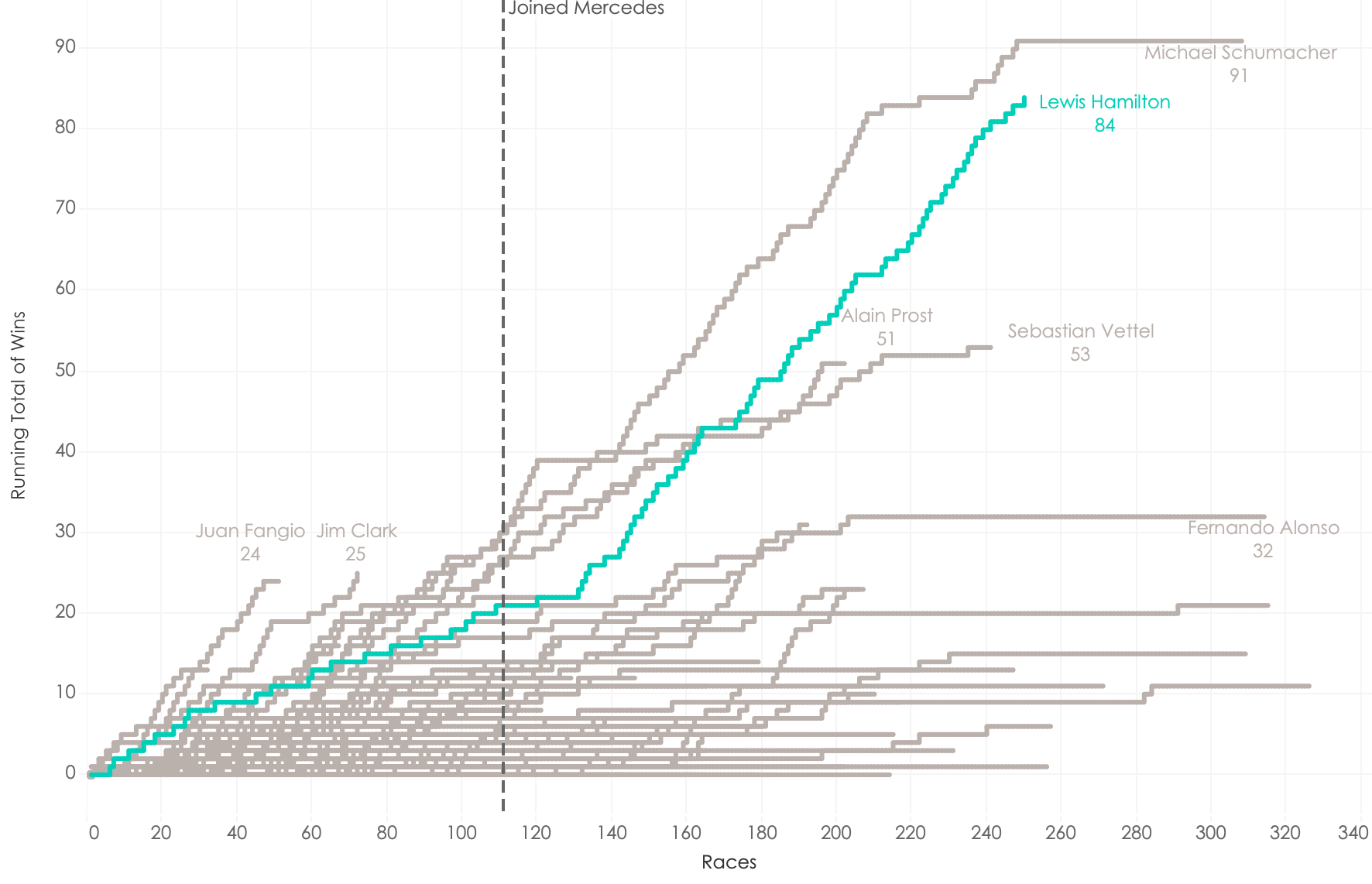
Hamilton, meanwhile, illustrates the opposite trajectory. An undoubtedly impressive, but more steady start to his career with McLaren is not dissimilar to the stats achieved in Vettel’s Ferrari stint. His current position with Mercedes shows a dominance representative of Vettel at Red Bull. With his Mercedes wins fresh in the memory, Hamilton’s position in the great’s is secured as he chases down Schumacher’s all time record for race wins and titles.
No-one can rob Vettel of his Titles and victories, but if 2020 is to be his last year in Formula 1, his performance in the remaining races of the reduced season will go a long way in determining which Vettel lives on in the memory of F1 fans.

1 comment
I fell victim to a con artist who posed as Lewis Hamilton on Facebook. Being a huge fan of Formula 1 and considering Lewis as my idol, I was thrilled when someone named “Lewis Official” with Lewis’ profile picture contacted me. One thing led to another, and I ended up sending money to support his supposed charity foundations, believing it would be the easiest way to meet him in person. Unfortunately, I realized too late that I had been scammed, losing over $325,000 in the process.
Desperate for a resolution, I reported the case to the FBI ten months ago, but I’m still waiting for their response. It was during this frustrating period that I stumbled upon Mr. Wilford online. He assured me that there was a greater chance of recovering my money, as scammers never cease their fraudulent activities. Apparently, when apprehended, scammers often have substantial amounts of money in their bank accounts or Bitcoin wallets. Mr. Wilford explained that if I could provide comprehensive information about our conversations and all the transaction receipts, there was hope for retrieving my funds.
Initially skeptical, I decided to give it a shot since the FBI’s progress was painfully slow. Mr. Wilford and his team even reached out to the real Lewis Hamilton, who confirmed that similar cases were being dealt with by his management on various social media platforms. To my astonishment, Mr. Wilford’s forensic teams managed to trace the scammer to Africa, where he was apprehended with millions of dollars in his bank account and Bitcoin wallet. It turns out he had been defrauding unsuspecting online users for quite some time.
If you ever find yourself in a similar situation involving online romance, loan, or Bitcoin scams, I highly recommend reaching out to Mr. Wilford and his team (contact@cyberjusticerecoveryhub.com) Together, let’s bring these scammers to justice and make them pay for their wicked acts. You can contact them via email…